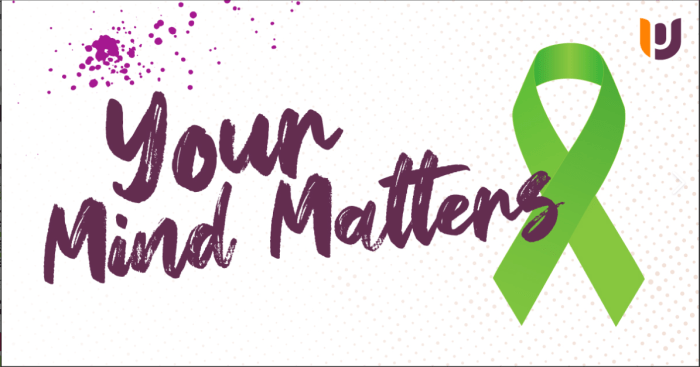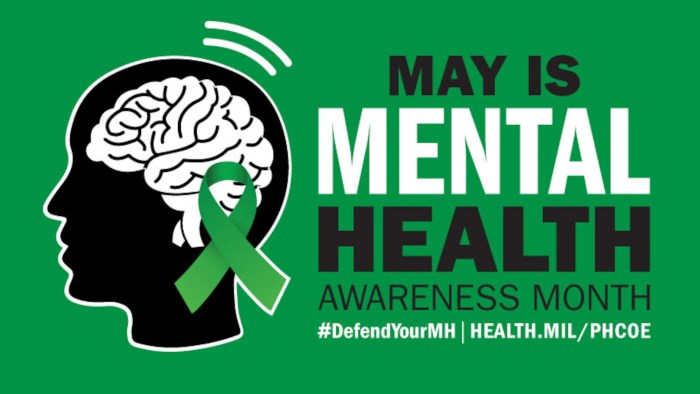With mental health awareness at the forefront, let’s dive into a world where understanding, impact, and challenges intersect, painting a vivid picture of the importance of this crucial topic.
From the benefits of promoting awareness to the role of social media in spreading the message, this journey will explore various facets of mental health awareness initiatives and their significance.
Importance of Mental Health Awareness
Mental health awareness is crucial for individuals and society as a whole. It helps to break down barriers and stigma surrounding mental health issues, encouraging people to seek help and support when needed.
Benefits of Promoting Mental Health Awareness
- Increased awareness leads to early detection and intervention, improving treatment outcomes.
- It helps to create a supportive environment for those struggling with mental health challenges.
- Promoting mental health awareness can reduce the prevalence of mental health disorders in the long run.
Reducing Stigma and Improving Well-being
By increasing awareness about mental health, we can reduce the stigma associated with seeking help for mental health issues. This can lead to improved overall well-being and quality of life for individuals.
Mental Health Awareness Initiatives

In recent years, there has been a surge in mental health awareness initiatives aimed at destigmatizing mental health issues and providing support to those in need. These campaigns and programs play a crucial role in spreading awareness, promoting self-care, and offering resources for individuals struggling with mental health challenges.
Mental Health Awareness Campaigns and Programs
- 1. National Alliance on Mental Illness (NAMI): NAMI is a well-known organization that offers education, support, and advocacy for individuals and families affected by mental illness. Their programs include support groups, educational resources, and awareness campaigns.
- 2. #BellLetsTalk: This social media campaign initiated by Bell Canada aims to break the silence around mental health issues and raise funds for mental health initiatives. It encourages people to share their experiences and support others in need.
- 3. Crisis Text Line: This 24/7 texting service provides free, confidential support for individuals in crisis. By simply texting “HOME” to 741741, people can connect with trained crisis counselors who offer support and resources.
Impact of Successful Initiatives
- 1. The #BellLetsTalk campaign has raised millions of dollars for mental health initiatives and has sparked important conversations about mental health on social media platforms.
- 2. NAMI’s educational programs have reached countless individuals and families, providing them with valuable information and support to navigate the challenges of mental illness.
- 3. Crisis Text Line has helped countless individuals in crisis situations find the support they need, potentially saving lives and offering a lifeline during difficult times.
Role of Social Media in Spreading Awareness
Social media plays a significant role in spreading awareness about mental health by providing a platform for sharing stories, resources, and support. Platforms like Instagram, Twitter, and Facebook allow individuals to connect with others, access mental health resources, and participate in online campaigns that promote mental health awareness. Through the power of social media, important conversations about mental health are amplified, reducing stigma, and encouraging individuals to seek help when needed.
Impact of Mental Health Awareness on Communities
Mental health awareness plays a crucial role in influencing the well-being of communities. By promoting understanding and empathy towards mental health issues, awareness initiatives can create a more supportive and inclusive environment for individuals facing challenges.
Positive Influence on Community Well-being
- Increased acceptance and reduced stigma surrounding mental health conditions.
- Encouragement of open conversations and seeking help when needed.
- Promotion of mental wellness and self-care practices within the community.
Stories and Case Studies
“After attending a mental health awareness workshop in our neighborhood, I felt more comfortable talking about my struggles with anxiety. The support I received from friends and family was overwhelming, and I no longer felt alone in my journey towards healing.”
Importance of Education and Open Conversations, Mental health awareness
- Education helps dispel myths and misconceptions about mental health, fostering a more informed community.
- Open conversations create a safe space for individuals to share their experiences and seek support without fear of judgment.
- By promoting awareness and understanding, communities can work together to provide resources and assistance to those in need.
Challenges in Promoting Mental Health Awareness

Promoting mental health awareness can face various challenges that hinder progress and acceptance in society. These obstacles can stem from misconceptions, cultural beliefs, and societal factors that impact how mental health is perceived and addressed.
Misconceptions and Stigma
- One major challenge is the persistent stigma surrounding mental health issues. Many people still view mental health struggles as a sign of weakness or something to be ashamed of.
- These misconceptions can prevent individuals from seeking help or talking openly about their mental health, leading to isolation and worsening conditions.
- Education and awareness campaigns are essential in debunking these myths and reducing the stigma associated with mental health challenges.
Cultural and Societal Factors
- Cultural beliefs and norms can also play a significant role in how mental health is perceived within different communities.
- Some cultures may view mental health issues as a personal failure or a result of spiritual possession, making it challenging for individuals to seek professional help.
- Societal pressures, such as expectations of strength and resilience, can further deter individuals from acknowledging their mental health struggles and seeking support.
Strategies to Overcome Challenges
- Increasing culturally sensitive mental health services and resources can help bridge the gap between different belief systems and encourage more individuals to seek help.
- Collaborating with community leaders, schools, and organizations to promote open discussions about mental health can help normalize conversations and reduce stigma.
- Implementing mental health education programs in schools and workplaces can equip individuals with the knowledge and tools to support themselves and others effectively.